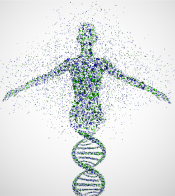The U.S. must do some heavy lifting to prepare for heritable genome editing
By Josephine Johston,
STAT
| 09. 04. 2020
Countries contemplating giving the green light to heritable genome editing received specific guidance from an international commission this week on how to prepare for a future in which the technology is safe and effective enough to use in human reproduction.
The commission was created in response to the news almost two years ago that a scientist in China had edited the genomes of two babies when they were single-cell embryos. (It subsequently emerged that a third baby with an edited genome had been born.)
While the scientist involved, He Jiankui, was widely condemned for conducting a premature and unethical experiment, and later fined and sentenced to jail, his first-in-humans experiment pushed the international community beyond a “germline editing — good or bad?” discussion to actively considering what it would take to justify its use.
Germline gene editing raises particular ethical and safety issues. Gene editing in a young child or adult creates changes that may affect the individual, but are not passed on to his or her children. Germline editing, also known as heritable genome editing, creates changes that...
Related Articles
By Katrina Northrop, The Washington Post | 04.06.2025
photo via Wikimedia Commons licensed under CC by 3.0
China's most infamous scientist is attempting a comeback. He Jiankui, who went to jail for three years after claiming he had created the world's first genetically altered babies, says he remains...
By Anumita Kaur [cites CGS’ Katie Hasson], The Washington Post | 03.25.2025
Genetic information company 23andMe has said that it is headed to bankruptcy court, raising questions for what happens to the DNA shared by millions of people with the company via saliva test kits.
Sunday’s announcement clears the way for a new...
By Peter Wehling, Tino Plümecke, and Isabelle Bartram
| 03.26.2025
This article was originally published as “Soziogenomik und polygene Scores” in issue 272 (February 2025) of the German-language journal Gen-ethischer Informationsdienst (GID); translated by the authors.
In mid-November 2024, the British organization Hope not Hate published its investigative research ‘Inside the Eugenics Revival’. In addition to documentating an active international “race research” network, the investigation also brought to light the existence of a US start-up that offers eugenic embryo selection. Heliospect Genomics aims to enable wealthy couples to...
By Frank Landymore, Futurism | 03.18.2025
You can only throw so much money at a problem.
This, more or less, is the line being taken by AI researchers in a recent survey. Asked whether "scaling up" current AI approaches could lead to achieving artificial general...




